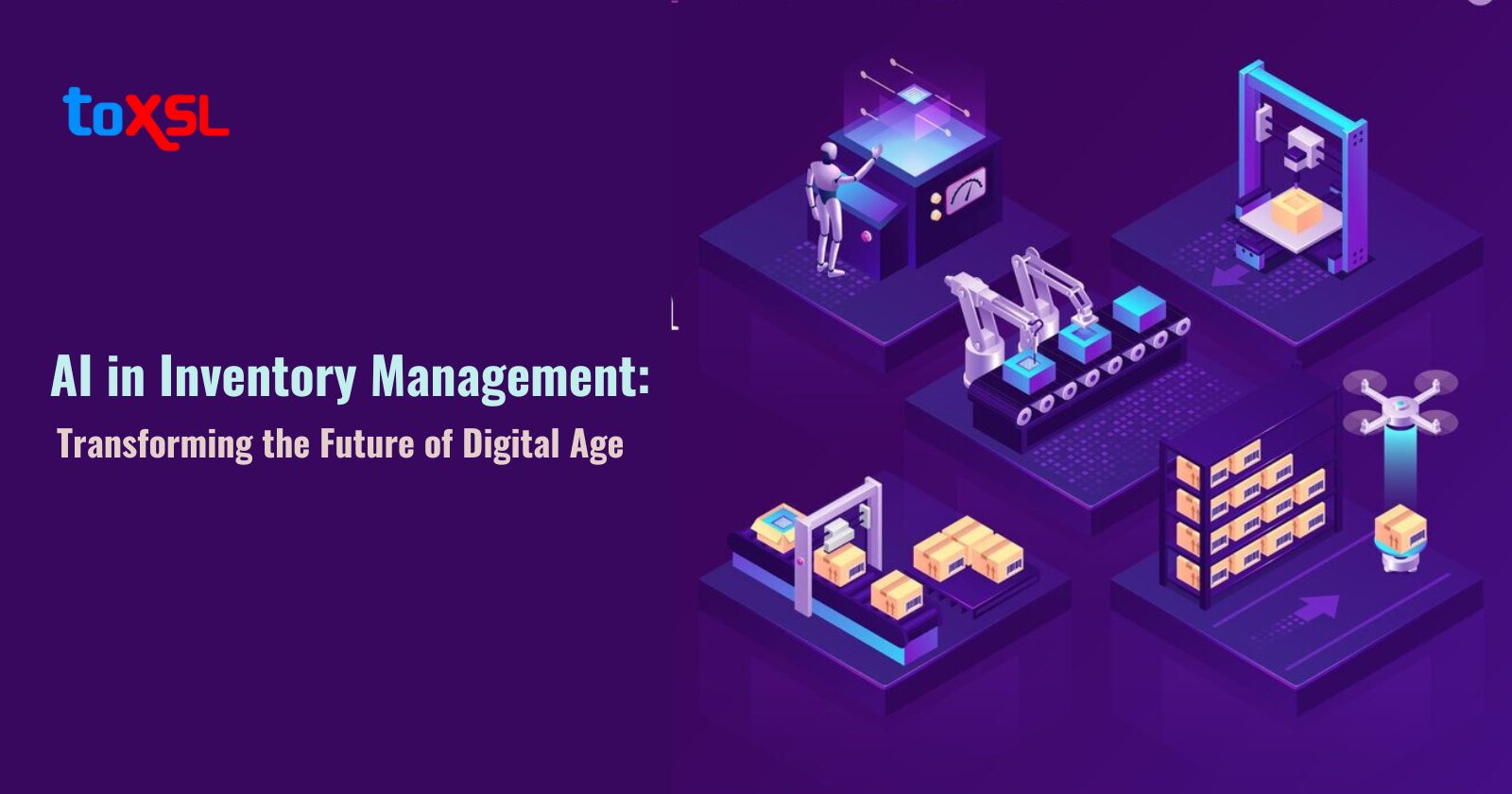- Mar 12, 2025
- Software Development
- 1402
Share this post on:

Artificial Intelligence in inventory management is a practice of using AI technologies in handling and automating the inventory management process.
Inventory management manages a company’s inventory levels, ensuring that the inventory is in the right place at the right time. AI has a huge impact on businesses worldwide and enhanced traditional inventory management through applications of data analysis, machine learning, and predictive analysis. AI can optimize numerous tasks including demand forecasting, and supplier management, among others.
One of the major components of inventory management is inventory optimization- a strategy that helps businesses maintain the required amount of goods to meet user demand while minimizing costs and maximizing revenue. Artificial Intelligence plays a significant role in improving optimization by enhancing efficiency, forecasting, and decision-making.
Use Cases for AI in Inventory Management
The following are the use cases for AI in inventory management:
Demand Forecasting: AI enables businesses to respond to changing marketplace demands. Using Machine Learning algorithms, companies can gain extra insights associated with customer behavior and demands, leading to higher stock forecasting. Demand forecasting is a manner of predicting consumer demand patterns over a selected period. AI facilitates businesses with accurate demand forecasts, minimizing the threat of excess inventory, and enhancing customer relationships.
Real-time Visibility: Technologies such as the Internet of Things (IoT) and Artificial Intelligence (AI) are helping businesses to enhance visibility into inventory locations and conditions. IoT networks help groups collect and percentage huge data, while AI facilitates businesses to examine this excessive volume of data and extract significant insights. Real-time visibility facilitates organizations totune inventory levels and supply chain conditions continuously.
Anomaly Detection: Artificial Intelligence wisely handles irregularities in sales patterns. Machine learning and deep learning algorithms help businesses process large amounts of data sets and easily detect outliers. Anomaly detection indicates issues such as theft, errors, and future demand fluctuations. These detection capabilities enable businesses to react quickly to potential issues and maintain inventory integrity.
Supplier Management: AI tools analyze supplier performance based on delivery times, quality, and pricing. They help businesses choose reliable, cost-effective partners, and strengthen customer relationships.
Scenario Simulation: AI helps businesses guess what can happen in the market and makes you aware of how things can affect your stock. This helps you get ready for when things change, for example, when people want more or less of your product. You can then create flexible plans for your stock that can quickly change as needed.
Automated Replenishment: AI can watch your stock levels all the time and automatically order more when things get low. This system helps you keep the right amount of stuff, so you don't run out or have too much.
Warehouse Operations: AI uses up-to-date information to make the warehouse work better. It helps businesses with how they arrange things and how you get orders ready. AI can tell business owners how big products are, what people want, and how fast things sell. With that, AI suggests the best way to store products. This makes work faster, gets orders out on time, saves money, and makes customers happier.
Also Read: How Much Does It Cost To Develop Inventory Management Software?
Benefits of AI in Inventory Management
When AI is used in inventory management, it enhances operational efficiency and decision-making. Let us now discuss the few benefits of AI in inventory management:
Enhanced Accuracy: AI algorithms can find patterns in historical data, market trends, and seasonal fluctuations. Also, it can find patterns in external factors and give information regarding the economy and weather. By analyzing old data, AI gives businesses accurate data and helps them maintain optimal inventory levels, reducing the risk of overstocking.
Cost Savings: AI optimizes inventory levels and minimizes excess stock. This helps organizations address inefficiencies in the supply chain and reduces costs, storage expenses, and waste.
Increased Efficiency: AI helps businesses automate routine tasks, including inventory tracking, and reorder processes, saves time, and allows employees to focus on strategic activities.
Improved Customer Satisfaction: AI in inventory management solutions helps businesses improve customer experience. These solutions ensure that the right products are always available, increasing customer satisfaction.
Scalability: AI systems are highly scalable and adapt to increasing inventories and changing business needs, helping businesses scale operations. It also ensures that while scaling a business, they do not lose efficiency.
Informed Decision-Making: AI solutions can easily adapt to the increasing inventory and changing business needs. This helps businesses scale operations while maintaining their efficiency.
Challenges Associated with AI Inventory Management
AI in inventory management offers numerous benefits, but it comes with numerous challenges as well. Let us shed some light on the challenges associated with AI inventory management.
Data Issues: AI relies on high-quality data to generate high-quality results. If the data is inaccurate, it leads to wrong predictions and businesses can end up making the wrong decisions. However, businesses have large amounts of data stored in various systems that can create data silos. Integration of these disparate data sources can be a complex and time-consuming process.
Resistance to Change: It is often witnessed that employees of an organization find it hard to adapt to new technologies. Overcoming this kind of challenge needs effective change management, communication, and training.
Initial Investment: The initial cost of AI technologies can be huge. In the beginning, businesses need to invest in software acquisition, integration, and training expenses. This investment can make it hard for small businesses.
Security Concerns: With the enhanced dependence on data, the concerns related to data privacy and security have increased. Further, organizations also need to ensure that their AI-powered inventory systems comply with security regulations and protect sensitive data.
Summary
To summarize, in this blog we discussed how AI is impacting inventory management and how businesses are becoming more efficient, robust, and scalable due to its incorporation. Artificial Intelligence is undeniably a game-changer for logistics businesses. By using Artificial Intelligence businesses are not only making their inventory processes easy but also enhancing the scope of their business.
As the technology grows, we can expect more and more advancements in Artificial Intelligence, leading to an unprecedented era of innovation, and addressing long-standing challenges. AI can help businesses enhance order tracking and gain real-time visibility into numerous processes simultaneously. This also clears potential hurdles and inventory issues that help businesses take proactive measures, ensuring seamless operations and elevating customer satisfaction to new heights.
Additionally, AI in inventory management holds a promise of paving the way for better innovative solutions that will help businesses unlock their potential. This will help them expand their horizons, scale globally, deliver great customer experiences, maximize efficiency and minimize costs. As we look ahead, AI’s influence keeps on growing. AI pushes businesses further redefine their boundaries and reshape the processes businesses operate within their supply chain.
However, incorporating AI into your existing inventory systems can be a challenging process. So, it is advised to hire the best software development company who have experienced AI developers on their team. An experienced team can help you build the best inventory software for your business that will innovatively handle your inventory processes and help you lead the industry.
Looking to hire the best AI-powered inventory management software development company, look no further than ToXSL Technologies. We are a leading software development company, renowned for solving numerous issues faced in today's inventory businesses globally. Our team of seasoned developers is committed to offering the best inventory solutions and solving your inventory-related challenges.
So, what are you waiting for? Get in touch with our experts today and let us set you up for success with the most innovative AI-based inventory management solutions.









